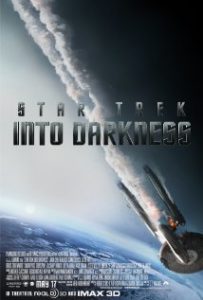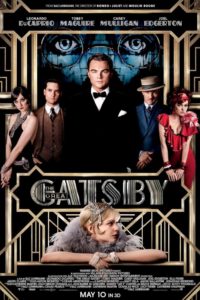 Star Trek Into Darkness is a sci-fi Hollywood blockbuster. The Hollywood blockbuster is basically a genre unto itself, loaded with its own pros and cons (“The action is awesome!” vs “Ugh, can they do anything but action?” “Shaky cams add realism!” vs “Enough with the shaky cams already…”). This becomes more of a problem for some because Into Darkness is a Star Trek film–and Star Trek is a thinking person’s sci fi, right? The debate has been encapsulated by fans with a quote from Captain Picard in the movie Insurrection: “Can anyone remember when we used to be explorers?”
Star Trek Into Darkness is a sci-fi Hollywood blockbuster. The Hollywood blockbuster is basically a genre unto itself, loaded with its own pros and cons (“The action is awesome!” vs “Ugh, can they do anything but action?” “Shaky cams add realism!” vs “Enough with the shaky cams already…”). This becomes more of a problem for some because Into Darkness is a Star Trek film–and Star Trek is a thinking person’s sci fi, right? The debate has been encapsulated by fans with a quote from Captain Picard in the movie Insurrection: “Can anyone remember when we used to be explorers?”
In other words, Star Trek is not supposed to be about action.
Balderdash. I’m not a huge fan of the original series, but it had its share of action sequences (and Gene Rodenberry had to rework the pilot to put in more action and make it more palatable to TV audiences–read into that what you will, but it’s been there since the start). One of the best Star Trek films is still Wrath of Khan, and the action and fighting is front and center there. This has only continued over the years with all subsequent movies and shows. Action is a part of Star Trek, and that shouldn’t be a surprise when you consider how varied the show is. It’s a delightful mix of politics, morality, relationships, emotions, and action–focusing on what it needs to focus on to tell its story. Star Trek is populist sci fi, not a niche sci fi film like 2001: A Space Odyssey (no matter how well known that film is, it is not populist).
Star Trek’s stories can be hit or miss, of course, but the stories that come alive are the ones that use any of those elements to explore its characters and ideas meaningfully. This can work in a revenge and action flick like Wrath of Khan or a more cerebral one exploring mortality like Generations. And it can work with a Hollywood blockbuster like Into Darkness.
Speaking of which (that preface did have a point), Into Darkness is stronger than its other JJ Abrams predecessor, which had a villain that liked to sit and brood in some dark throne room before randomly killing some things. The opponents in Into Darkness are allowed more time to develop and establish their motivations, which makes them more interesting foes for the new Kirk and Spock to tangle with. I worry that the opponents might rely a little bit too much on knowing earlier Star Trek stories to appreciate some of the nuances, but there is enough there for relative Star Trek newcomers to enjoy.
The actors playing the protagonists are also stronger in their second time around. Chris Pine as Kirk and Zachary Quinto as Spock are simply a delight to watch. They’re frustrated and intrigued by each other, their friendship growing even as they collide over how they respond to broken Starfleet regulations and the various crises a Hollywod blockbuster is going to throw at them. There wasn’t a scene where they weren’t clicking on all cylinders together. Even better, while they hit on the classic characteristics we know from Shatner and Nimoy in the same roles, they are carving their own way with the characters, not bound to where two actors have gone before… *ahem* it’s all enough to make a jaded movie-goer look forward to seeing them in the next movie.
The rest of the protagonists are a little more hit and miss. Zoe Saldana is allowed stronger dramatic moments than the original Uhura, thanks to her relationship with Spock (a change in this new Star Trek universe that is a welcome one). The script has less room for Chekhov, Scotty, and McCoy, who are reduced to their somewhat cliched parts. Simon Pegg works well within his limitations (he’s good fun as Scotty, even if he’s mostly used for humor), but I just can’t like Karl Urban as McCoy… he’s got the mannerisms of the original, and that’s it. He honestly feels like a caricature or someone spoofing the original McCoy, rather than finding the man in the character.
To JJ Abrams’s credit, he is juggling many things at once, and he’s paying good attention to the main characters and antagonists. That said, like his previous Star Trek outing (and many of the shows and movies he’s made), there are plot holes and strange technological workings that make you scratch your head if you stop to think about them. How is a character able to teleport across the galaxy when the Enterprise generally need to be orbiting a planet before they can beam something to it? The script doesn’t talk about this, even though the script later on won’t allow the crew to teleport someone that is less than a mile away.
Things are going too fast and too fun to make little things like this truly bothersome. The actors all believe in what’s going on and we’re just having fun watching them do it. This is populist sci fi doing what populist sci fi does best–and while it would be nice to have a Star Trek film in the future that explores the quieter side of the universe (or at least something more cerebral), this is still an enjoyable romp in the Star Trek Universe.

 s it necessary to do a spoiler-free review of a movie based on a book that’s almost a century old? Probably not, but there’s inevitably someone out there complaining when someone spoils the end of The Empire Strikes Back (okay, that was me–I couldn’t believe someone had “ruined it” for The Celt. She hadn’t seen the movie, so how could she know who Luke’s father was? Darn spoilery people types…).
s it necessary to do a spoiler-free review of a movie based on a book that’s almost a century old? Probably not, but there’s inevitably someone out there complaining when someone spoils the end of The Empire Strikes Back (okay, that was me–I couldn’t believe someone had “ruined it” for The Celt. She hadn’t seen the movie, so how could she know who Luke’s father was? Darn spoilery people types…).